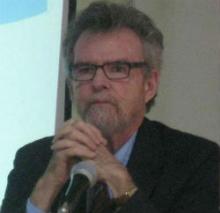What Is It
All there is in the world is physical stuff. That is the fundamental assumption of the materialist standpoint, and the picture given to us by science. But if there is no immaterial soul that survives the death of the body, no other realm to bestow meaning on our lives, how can we avoid despairing in light of this apparent pointlessness? Is there any way we can build meaning from the naturalistic building blocks that science provides? John and Ken talk materially with Owen Flanagan from Duke University, author of The Really Hard Problem: Meaning in a Material World. Recorded live on campus as part of the Stanford Continuing Studies series The Art of Living.
Listening Notes
This show begins with John laying out the materialist position. Modern science points to the world being just made of matter, with no souls floating around in it. Ken then expresses the worry that there is no room for meaning in a material world, citing concerns from Kierkegaard and Nietzsche. John says that it seems like we can’t find meaning, so we have to make it for ourselves.
Next, John and Ken welcome their guest, Dr. Owen Flanagan, a professor of neurobiology at Duke University. Ken puts forth the worry that materialism can’t ground objective values. Owen responds that value facts are relational and don’t always need objective grounding. Values exist because communities of people exist. John claims that there must be something objectively wrong with certain activities, like torturing children. Owen believes that social relations can explain these values. Though these values wouldn’t exist in a world without people, they are real to us because of our relations.
One audience member calls in to discuss the role of psychological priming on the meaning they find in the world. Because people are constantly influenced by their society and their peers, their values aren’t their own. Owen consents to this idea to an extent. The question of whether the values of certain societies are privileged then arises. John asserts that some values, like treating the sexes equally, are just rational. Owen thinks our biology and sociology can account for value facts like these being correct.
A few nonreligious viewpoints that are meant to prescribe values are discussed in this show. Ken brings up the ethics of the Epicurean philosophers in ancient Greece. Owen discusses his study of Buddhism. Compared to western religion, it is atheist, yet it is very morally serious. Buddhism gives a set of values and guides its followers in how to live their lives. At the end of the show, John says that maybe there’s meaning, and maybe there’s not. He’s still going to go on living his life and doing what he sees as right. Ken reiterates the point that if we want meaning in our lives, we are going to have to find it ourselves.
- Roving Philosophical Report (Seek to 5:25): Caitlin Esch interviews people involved in “interview an atheist at church day”. This program sets out to help atheists and religious people understand each other. One atheist responds that he “doesn’t find meaning, but he experiences things meaningfully.”




Comments (1)
meb_c
Thursday, November 30, 2023 -- 10:28 AM
Like Diogenes, we dressLike Diogenes, we dress ourselves in an appropriately-decorated barrel and wander through life searching for a perfect man or woman, ourselves in other clothing.